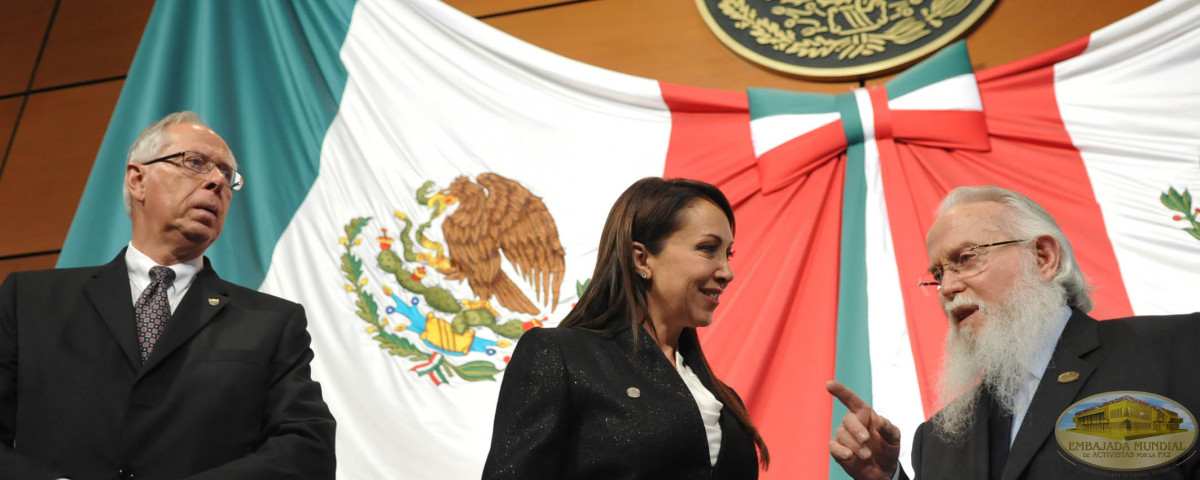
Dr. William Soto | SPEECH GIVEN AT THE CHAMBER OF DEPUTIES OF MEXICO
Honorable Deputy of the nation, Cristina Ruiz Sandoval, President of the Mexican Delegation of the Parliamentary Confederation of the Americas; Deputy Guadalupe Mondragón, Secretary of the Chamber of Deputies’ Committee on Public Education and Educational Services; esteemed congressmen; President of the National Human Rights Commission, Raúl Placencia Villanueva; Holocaust survivor Peter Katz; diplomatic body accredited to Mexico; Ms. Laura Bosques, daughter of Gilberto Bosques; representatives of the Jewish community; ladies and gentlemen, good afternoon.
I thank you for your invitation to be here and be able to introduce our project, Traces to Remember, which has been designed as an educational and preventative tool to safeguard human rights, and is currently being carried out with great success in Colombia, Panama, Paraguay, Argentina, and Chile.
The project consists of exhibiting a plaque with the handprints of a Shoah survivor and his descendants, as a way to be in solidarity with the victims and their suffering, because as the Secretary General of the United Nations stated upon the approval of Resolution 60/7, which designated January 27 as the International Day of Commemoration in Memory of the Victims of the Holocaust, this is “an important reminder of the universal lessons of the Holocaust, a unique evil which cannot simply be consigned to the past and forgotten.”
The Holocaust, or Shoah, is a stain of indignity and opprobrium (shame, public disgrace) on the history of the human race, because not only were those who perpetrated these acts guilty, those who remained silent also became accomplices. That is why today, although some people and nations seek to hide or lessen the magnitude of this genocide, meeting to support this Agreement of the Congress of the Union is a way to honor the memory of the victims.
We also believe that forgetting the Holocaust would be a crime, and not making it known to new generations would make us accomplices of those who deny it. For that reason, the Global Embassy of Activists for Peace also presented the government of Paraguay with a proposal to learn the lessons of this terrible chapter in history, which gave rise to the issuing of Resolution 684 by the Ministry of Education and Culture of the country on February 20, 2013, declaring the project Traces to Remember of educational interest.
Today, serious ignorance regarding the Holocaust is spreading, especially among new generations. This is why we wanted to find a way to preserve the testimonies of survivors while also creating opportunities for reflection on the commitment and individual courage it takes to defend human rights, learning from the survivors themselves about the example set by those heroes who remain anonymous, but risked their lives to save another; heroes who are now the role models we must follow, such as the case of Mexican diplomat Gilberto Bosques Saldívar, who served as the consul of Mexico in France from 1939 to 1944, during World War II, helping more than 30,000 people (a rough estimate according to historian Christian Kloyber) flee from the Nazis and the threats of Francoist Spain. These people included thousands of Jews, Spaniards, French, and Lebanese who were issued Mexican passports and were able to change the course of their lives.
It is urgent and necessary not only to make laws, but also to support projects that promote the defense of human rights and respect for differences, be they political, religious, or of any other kind. For we see that in the 21st century, every day manifestations of hatred, segregation, violence, and death continue emerging in different parts of the world.
Mexico stands out in the area of human rights defense given that it has very advanced laws forbidding the incitement of hate, intolerance, and violence. An example of this is the “Federal Act for the Prevention and Elimination of Discrimination” which states the following in Article 4:
“For the purposes of this Act, discrimination shall mean any distinction, exclusion or restriction, based on ethnic or national origin, sex, age, disability, social or economic conditions, health conditions, pregnancy, language, religion, opinions, sexual preferences, civil status or any other reason whose purpose is to impede or annul the recognition or the exercise of rights and real equity for persons opportunities… it will also be considered as discrimination, xenophobia, and antisemitism in every one of its manifestations.”
At first glance, Traces to Remember may seem to be focused on the Shoah and the testimony of the survivor, but in reality, it is a project directed to the entire human race with the purpose of protecting fundamental rights and seeing to it that each individual becomes an upholder of the life and dignity of every man, woman, and child who lives on this planet earth.
We have taken this project to universities, diplomatic offices, schools, libraries… and in every place, the results have been remarkable and wonderful. We are certain that it will produce beneficial results here as well, by supporting this Agreement of the Honorable Congress of Mexico, as it will be of help in uprooting the seeds of hate and intolerance.
For this reason, I would like to propose to you with utmost respect, that through a law of Congress, the Holocaust be included as a subject of study and debate in the last years of high school, and as a course of study or a case study in universities, in order to encourage reflection on the value of life and human dignity.
If this idea is welcome among you, I offer all the assistance that the Global Embassy of Activists for Peace can provide.
And for those who prefer to ignore the atrocities that man is capable of committing, those who insinuate that it is time to turn the page, to move forward and forget, we say to them: “We will turn the page when we are completely certain that we have learned the lesson."